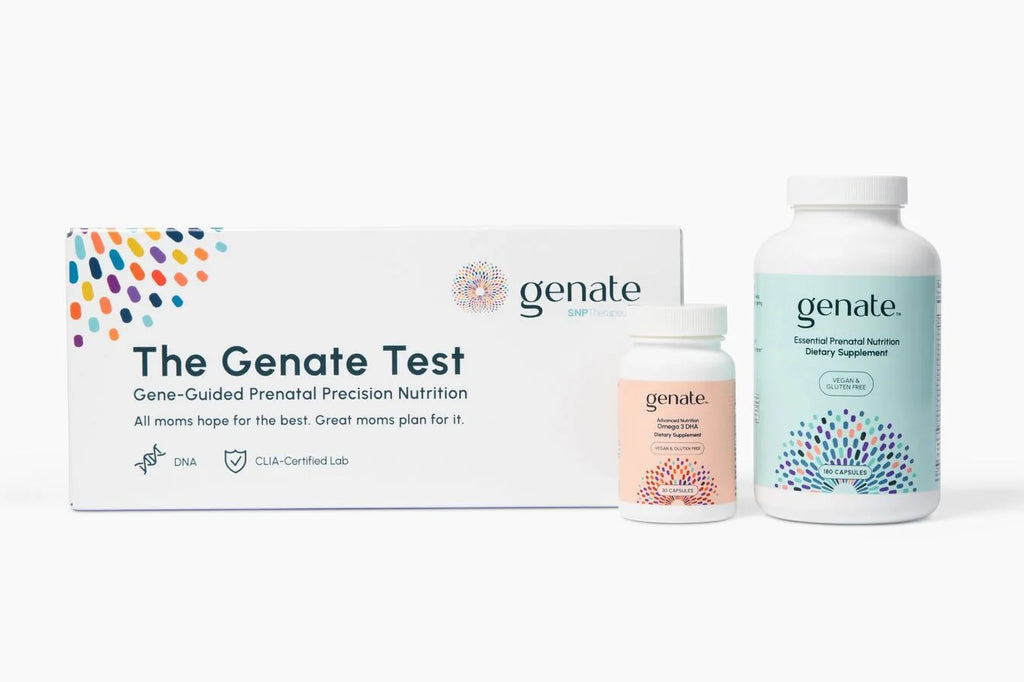One-Carbon Metabolism & Dietary Sources of One-Carbon Nutrition
May 12, 2023
What is One-Carbon Metabolism?
One-carbon metabolism is a critical process that plays a crucial role in the health of pregnant and breastfeeding women, as it is involved in the production of DNA and other molecules essential for fetal development and lactation.
During pregnancy and breastfeeding, the demand for nutrients – especially one-carbon nutrients – increases to support the growing fetus and provide adequate nutrition for the mother and baby. One-carbon metabolism becomes especially important during these periods, as it is necessary for the synthesis of DNA, which is essential for the development of the baby's genetic material.
What are One-Carbon Nutrients?
One-carbon nutrients are involved in many biological processes that are critical for the proper development of the brain, spinal cord, and nervous system. Your baby’s brain and nervous system grow rapidly before birth and in the first 1,000 days of their life, making the periods of pregnancy and breastfeeding a unique time for you to positively influence their cognitive development through your nutrition intake.
While you can easily obtain some one-carbon nutrients from foods, others are not as readily available or are typically not palatable to pregnant people. These nutrients can be provided through supplements to ensure adequate levels for your baby’s growth and development.
4 Sources of One-Carbon Nutrients
1. Choline
Recommended Adequate Intake (AI) of Choline:
- Non-Pregnant Women: 425 mg/day
- During Pregnancy: 450 mg/day
- After Pregnancy (Lactation): 550 mg/day
Choline is critical for the development of your baby’s brain, spinal cord, and nervous system for several reasons, one of which is that choline forms a primary component of cell membranes. It also plays an essential role in DNA formation, making choline a key nutrient for gene expression.
In addition, choline is an essential factor in the production of neurotransmitters, which are molecules that carry signals throughout the body from one cell to another. Without enough choline, people can have trouble with their memory, moods, control of their muscles, and other problems related to their brain and nervous system. Choline also has critical functions in gene expression and DNA formation.
Because of the many roles played by choline in cognitive growth and development, the body’s requirements for choline increases during pregnancy and breastfeeding. Low choline intake in mothers during pregnancy has been linked to lower scores on cognitive tests in their children that persist until at least age seven.
Choline and folate, another one-carbon nutrient, are dependent on each other in that both nutrients are used in the production of methionine. Methionine is an amino acid that is important for the synthesis of DNA. This helps explain why both choline and folate deficiencies in mothers have been found to raise the risk of neural tube defects in their infants.
In addition, if a woman has a folate deficiency (which can be caused by low intake or a genetic alteration that interferes with how the body uses folate), her body’s requirement for choline will increase.
Food Sources of Choline:
Choline is not a widespread nutrient in foods, and it isn’t included in most prenatal supplements due to the large size of the choline molecule. The best food sources of choline include beef (particularly beef liver), eggs, chicken, fish, soybeans, and dairy foods.
See the table below for these and other food sources that provide the highest levels of choline. (Source: National Institutes of Health)
| Food | Milligrams (mg) per serving | Percent DV % |
|---|---|---|
| Beef liver, pan fried, 3 ounces | 356 | 65 |
| Egg, hard boiled, 1 large egg | 147 | 27 |
| Beef top round, lean only, 3 ounces | 117 | 21 |
| Soybeans, roasted, ½ cup | 107 | 19 |
| Chicken breast, roasted, 3 ounces | 72 | 13 |
| Fish, Atlantic cod, cooked, 3 ounces | 71 | 13 |
| Potatoes, red, baked, flesh and skin, 1 large | 57 | 10 |
| Wheat germ, toasted, 1 ounce | 51 | 9 |
| Beans, kidney, canned, ½ cup | 45 | 8 |
| Quinoa, cooked, 1 cup | 43 | 8 |
| Milk, 1% fat, 1 cup | 43 | 8 |
| Yogurt, vanilla, nonfat, 1 cup | 38 | 7 |
| Brussels sprouts, boiled, ½ cup | 32 | 6 |
| Broccoli, chopped, boiled, drained, ½ cup | 31 | 6 |
2. Folate
Recommended Daily Intake (RDI) for Folate:
Pre-Pregnancy: 400 mcg/day
During Pregnancy: 600 mcg/day
After Pregnancy (Lactation): 600 mcg/day
This one-carbon nutrient is one of the B vitamins. Folate is known for helping to prevent neural tube defects, and it is critical throughout pregnancy but especially in the first trimester, when the neural tube is forming. This is reflected in recommended daily intakes for folate, which increase from 400 mcg/day to 600 mcg/day during pregnancy and lactation.
Folate is crucial for cell division (which occurs at a rapid rate in a developing fetus), nervous system growth and development, and the production of energy in the body. Alcoholism, folate disorders that cause poor absorption, and genetic alterations that affect the body’s metabolism of folate can all lead to low levels in the body.
Folate deficiency in pregnant women has been linked to higher rates of neural tube defects and poor cognitive function in their babies. (Source: Naninck et al., Adv Nutr, 2019)
Food Sources of Folate:
Folate is naturally found in a wide variety of foods. Those with the highest levels of folate include beef liver, dark green leafy vegetables, black-eyed peas, brussels sprouts, asparagus, and rice. Eating a varied diet that contains both plant and animal foods will ensure a consistent and adequate intake of this nutrient.
The synthetic form of folate, folic acid, is also added to prenatal supplements and some fortified foods. Most pasta, breads, and breakfast cereals are made with enriched wheat or corn flour, which has folic acid added to it. See the table below for the best food sources of folate and folic acid. (Source: National Institutes of Health)
| Food | Micrograms(mcg) per serving | Percent DV |
|---|---|---|
| Beef liver, braised, 3 ounces | 215 | 54 |
| Spinach, boiled, ½ cup | 131 | 33 |
| Black-eyed peas, boiled, ½ cup | 105 | 26 |
| Breakfast cereals, fortified | 100 | 25 |
| Rice, white, cooked, ½ cup | 90 | 22 |
| Asparagus, boiled, 4 spears | 89 | 22 |
| Brussels sprouts, boiled, ½ cup | 78 | 20 |
| Spaghetti, cooked, enriched, ½ cup | 74 | 19 |
| Lettuce, romaine, shredded, 1 cup | 64 | 16 |
| Avocado, raw, sliced, ½ cup | 59 | 15 |
| Spinach, raw, 1 cup | 58 | 15 |
| Broccoli, chopped, cooked, ½ cup | 52 | 13 |
| Mustard greens, boiled, ½ cup | 52 | 13 |
| Bread, white, 1 slice | 50 | 13 |
| Green peas, boiled, ½ cup | 47 | 12 |
| Kidney beans, canned, ½ cup | 46 | 12 |
| Wheat germ, 2 tablespoons | 40 | 10 |
3. Betaine
Betaine is related to folate in that both nutrients can act in the formation of methionine, an amino acid necessary for DNA synthesis. When the intake of folate is low, or the body’s levels are compromised due to genetic variations that interfere with folate metabolism, betaine needs rise even higher. This nutrient is also important for liver and kidney function as well as heart health. Betaine has been shown to lower cholesterol and blood lipid levels in animals with heart disease. (Source: Craig, ACJN, 2004)
Although betaine is an essential nutrient for cognitive function due to its role in DNA synthesis, there is no established recommended daily intake for this nutrient. Researchers have determined that 9–15 g/day of betaine is a safe range, but no minimum level has been established.
Food Sources of Betaine:
Data on betaine amounts in specific foods is limited compared to the amount of data available for other one-carbon nutrients. Although a comprehensive database does not exist as it does with many other vitamins and minerals, researchers have examined betaine levels in various foods to determine good sources of this nutrient.
Betaine is found primarily in shellfish (such as shrimp), enriched grain products, and certain vegetables, including beets and spinach. Research on this nutrient indicates that it is widespread among plants, animals, and other organisms, although the levels certainly vary among food sources. (Source: Craig, ACJN, 2004)
The list that follows includes the best food sources of betaine based on data available from laboratory analysis and clinical studies. (Sources: Cho et al., AJCN, 2008 and Zeisel et al., J Nutr, 2003)
The Best Food Sources of Betaine:
- Beef
- Spinach
- Beets
- Enriched pasta, white and wheat bread, and pretzels
- Enriched breakfast cereals
- Wheat bran
- Wheat germ
- Shrimp and other shellfish
4. Vitamin B12
While vitamin B12 is not itself a one-carbon nutrient, it plays a critical role in folate metabolism. Thus, it is a vitamin needed for nervous system formation. Vitamin B12 also works to ensure normal red blood cell function and synthesis of DNA.
Along with the one-carbon nutrients, vitamin B12 is critical for the development of the neural tube, which is the foundational structure of brain formation. Studies show that just as with folate, betaine, and choline, vitamin B12 deficiency in mothers during pregnancy is linked to higher rates of neural tube defects in their children. (Source: Gaber, Clin Lab, 2007)
This research shows that while folate is often the most recognized nutrient in the prevention of neural tube defects, it is critical that pregnant people consume adequate amounts of each of the one-carbon nutrients and vitamin B12 to lower their baby’s risk of neural tube defects and potentially lifelong consequences associated with them.
Food Sources of Vitamin B12
Vitamin B12 is only found naturally in animal foods such as meat, fish, eggs, and dairy products. However, B12 is added to many fortified foods as well. Interestingly, this vitamin is absorbed most easily by the body from dairy foods and supplements compared to other food sources. See the table below for the best sources of vitamin B12. (Source: National Institutes of Health)
| Food | Micrograms(mcg) per serving | Percent DV |
|---|---|---|
| Beef liver, pan-fried, 3 ounces | 70.7 | 2,944 |
| Clams (without shells), cooked, 3 ounces | 17 | 708 |
| Tuna, bluefin, cooked, 3 ounces | 9.3 | 385 |
| Nutritional yeast, fortified, ¼ cup | 8.3 - 24 | 346 - 1,000 |
| Salmon, Atlantic, cooked, 3 ounces | 2.6 | 108 |
| Ground beef, 85% lean, cooked, 3 ounces | 2.4 | 100 |
| Milk, 2% milkfat, 1 cup | 1.3 | 54 |
| Yogurt, plain, fat free, 6-ounces | 1.0 | 43 |
| Breakfast cereals, fortified with 25% DV B12, one serving | 0.6 | 25 |
| Cheese, cheddar, 1½ ounces | 0.5 | 19 |
| Egg, whole cooked, one large | 0.5 | 19 |
| Turkey, breast meat, roasted, 3 ounces | 0.3 | 14 |
One-Carbon Nutrient Applications for Pregnant and Breastfeeding Women
It is important for pregnant and breastfeeding women to consume each of these one-carbon nutrients on a consistent daily basis to ensure a steady supply for the fetus and growing infant. While meeting the recommended daily intake is the goal for the general population, studies show that genetic alterations, or SNPs, that interfere with how the body processes one-carbon nutrients are common.
Women with one or more SNPs will need to consume more one-carbon nutrients than the recommended daily amount to make up for the inefficiencies in their body’s metabolism. It’s important to keep in mind that an SNP in any of the one-carbon nutrient pathways will affect a person’s requirement for the other one-carbon nutrients. This is because they are all connected and depend on each other for proper metabolism and function.
If you are concerned about your intake of one-carbon nutrients through diet or you have confirmed SNPs that affect your body’s one-carbon pathways, talk to a dietitian, certified nutritionist, or other health care provider. They can help you put a nutrient-dense diet in place to ensure you consume all of the one-carbon nutrients consistently.
Alternatively, women who have a difficult time eating foods high in one-carbon nutrients consistently, as is often the case during pregnancy (due to nausea, heartburn, and other factors), may choose to use supplements. Because one-carbon nutrients are frequently found at the highest levels in animal-based foods such as meat, eggs, and dairy, women who follow a vegan or vegetarian diet including little or no animal foods may need a supplement to ensure adequate intake.
If you’re having trouble consuming enough one-carbon nutrient food sources or have been told you have an SNP that affects your body’s one-carbon nutrient metabolism, discuss with your healthcare provider the possibility of taking a prenatal supplement to make sure you’re getting enough of these nutrients to meet your baby’s needs.
While prenatal supplements that deliver one-carbon nutrients are critical before and during pregnancy, many healthcare providers recommend that women who are breastfeeding continue to take them after their baby is born. The nutrients you consume through your diet and supplements will be passed on to your infant in your breast milk.
One-Carbon Metabolism in Closing
The importance of establishing and maintaining adequate levels of each of the one-carbon nutrients and vitamin B12 in pregnancy and the first 1,000 days of life cannot be overstated. During the pregnancy and breastfeeding period, you have a singular opportunity to help your child’s brain and nervous system grow and develop optimally through your nutritional choices. The positive impacts it can have on your child may last for a lifetime.
To learn more about which nutrients you may need to supplement, check out The Genate Test to screen for nutritional deficiencies during pregnancy.
More Articles:
Take the Genate Test
Learn how to tailor your pregnancy nutrition to your unique genetic signature.




